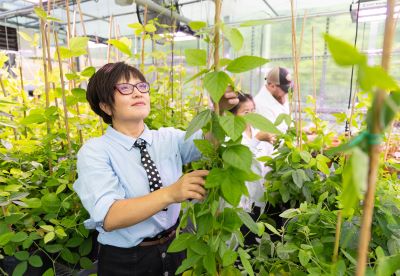Editor’s note: Innovation Thursday is a regular series in WRAL TechWire focusing on thought-leading companies, entrepreneurs and trends.
+++
RESEARCH TRIANGLE PARK – Soybeans are sometimes called magic beans due to their wide utility. They are used as livestock feed, in human foods ranging from tofu to salad oil, in crayons that are non-toxic and safer for children, in biodiesel fuel, in household cleaners and in countless other products.
The versatile plant has the largest footprint of any crop in North Carolina, accounting for nearly 6 percent of the state’s farm income – more than corn, tobacco, sweet potatoes and other crops. Soybeans are grown in every one of the state’s 100 counties, from the mountains to the coast, and bring farmers about $800 million in a good year.
Bao-Hua Song, Ph.D., a biology professor at the University of North Carolina Charlotte, wants to keep those good years coming.

-Photo by Amy Hart
This fall she won a $2.8 million grant from the National Science Foundation (NSF) to develop new and diverse soybean varieties that can resist the world’s most damaging soybean pest, a tiny roundworm called the soybean cyst nematode (SCN).
The parasite feeds on the roots of soybean plants, stunting root and leaf growth, and reducing the number of soybean pods that form. Annual crop losses due to SCN amount to up to $1.5 billion in the United States.
Song aims to develop new and diverse soybean varieties with broad-spectrum resistance to SCN.
“High levels of crop losses have implications not only for farm viability but for worldwide food production,” Song told Inside UNC Charlotte, the university’s online news site. “The most efficient and environmentally friendly approach to mitigating SCN damage is to develop and deploy new soybean varieties that can withstand it.”
NSF grant to foster collaboration
The five-year NSF grant will allow Song to convene an interdisciplinary group of researchers with a diverse range of plant biology expertise, including multi-omics, systems biology, functional genetics, plant physiology and computational biology, to tackle the challenge. Key collaborators will include Mukhtar Shahid of the University of Alabama at Birmingham and Chen Sixue of the University of Mississippi.
The team will try to understand more deeply the molecular mechanisms of broad SCN resistance in wild relatives of farmed soybean plants.
“We know that the wild soybean Glycine soja, for example, possesses genomic diversity that holds untapped genetic resources for identifying novel SCN-resistant genotypes,” Song said. “This will remain important as we move forward with developing new soybean varieties.”
Song’s research grant, awarded through the NSF’s Plant Genome Research Program, also includes support for expanding the level of computational expertise in plant science. A goal is to increase the number of scientists and educators qualified to work in and teach systems biology, the computational and mathematical analysis and modeling of complex biological systems.
Song will collaborate with Charlotte Teachers Institute to develop ways to provide hands-on education and training to undergraduate and graduate students and high school science teachers. The proposed work includes the creation of a new course in systems biology along with workshops, seminars and symposia for scientists and teachers.
The NSF grant comes at an opportune time for Song to enhance her research and advance her career. In July she was promoted to full professor at UNC Charlotte after first serving as an assistant professor, then an associate professor.
“The NSF recognizes that mid-career scientists benefit from support that allows them to secure research time,” she said. “Support of this kind affirms my desire and potential to become an international leader and teacher-scholar as UNC Charlotte moves to the forefront of this exciting field.”
Support from NCBiotech
According to Song, the NSF award would not have been possible without prior support from the North Carolina Biotechnology Center. Since 2014, her team has received four research grants from NCBiotech to support the foundational research in SCN resistance and to explore strategies for SCN management.
“Over the years, NCBiotech has supported us with over $200,000, which is a game changer as it allowed us to collect necessary preliminary data that led to the successful application for this NSF award,” Song said. “In addition, the work supported by NCBiotech led to 17 peer-reviewed publications and much-needed training opportunities for postdocs, graduate students and undergraduate students (over 15 trainees). These grants are especially meaningful for us as UNC Charlotte is a growing urban institution of more than 30,000 students, with a substantial number of first-generation, low-income and underrepresented students.”
Susan Lankford, Ph.D., director of science and technology development for NCBiotech, said, “We are so pleased to have played a part in the advancement of Dr. Song’s research. Our grant programs are designed to enable researchers to generate data for subsequent funding opportunities; thus, outcomes such as Dr. Song’s NSF award are especially gratifying. Dr. Song is an outstanding scientist, who is exceptionally creative and energetic, and we congratulate her and her team on this award.”
Song’s work has also received funding from the National Institutes of Health, the North Carolina Research Campus, Charlotte Research Institute, Monsanto Co., the North Carolina Soybean Producers Association and UNC Charlotte.
Her research is broadly focused on understanding the molecular basis and evolution of complex trait variations significant to agriculture, human health and climate adaptation.
Song earned her Ph.D. from the Beijing Institute of Botany at the Chinese Academy of Sciences and received postdoctoral training at the Max Planck Institute of Chemical Ecology in Jena, Germany, and at Duke University.
(C) N.C. Biotech Center





























